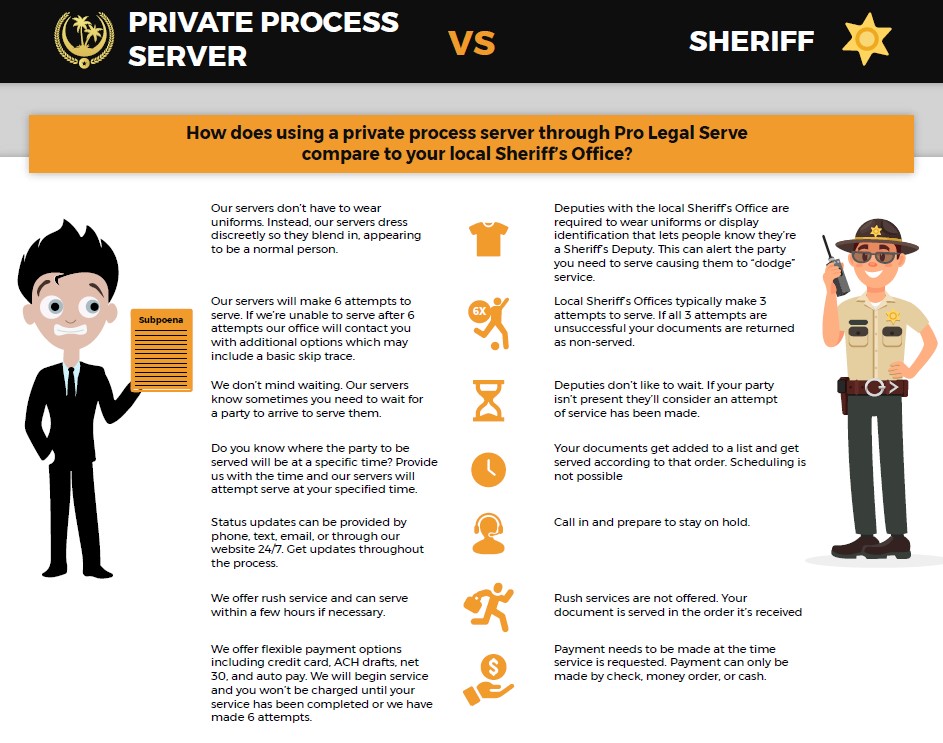The Role of Professional Process Serving in Effective Legal Situation Monitoring
The Role of Professional Process Serving in Effective Legal Situation Monitoring
Blog Article
Process Offering: A Critical Action In Legal Document Distribution
Refine offering plays an important duty in the legal framework, making sure that all events are appropriately informed of pending lawful activities. Various kinds of lawful documents are served, each with its own ramifications and needs. Understanding the nuances of these difficulties is crucial, as they can have profound ramifications for the stability of lawful process.
Relevance of Refine Offering
Refine offering is a critical component of the legal system, acting as the official methods through which people are informed of lawsuits involving them. This procedure is essential as it guarantees that all parties receive correct notification, therefore promoting the concepts of due process and fair depiction in lawful procedures. Without efficient process offering, people may remain not aware of legal actions, possibly resulting in judgments made in their absence and significant effects.
The value of procedure serving prolongs beyond mere alert; it additionally adds to the stability and efficiency of the judicial system. Correctly served documents permit prompt feedbacks from the events included, helping with the progression of cases via the courts. Additionally, adherence to lawful needs surrounding procedure serving minimizes the possibilities of disputes pertaining to service, therefore minimizing delays in lawful proceedings.
Additionally, process offering works as a vital safeguard against unimportant suits. By ensuring that accuseds understand claims versus them, it helps to prevent baseless actions and urges responsible legal techniques. Ultimately, the function of procedure serving is foundational in keeping the rule of legislation and making certain that justice is available to all people entailed in legal matters.
Sorts Of Lawful Documents Served
Lawful records served in the context of process serving include a vast array of materials essential for various sorts of lawsuit. Process Serving. These documents can include summons, subpoenas, writs, and grievances, each offering a distinctive purpose in the legal process
A summons is normally released to notify a defendant of a lawsuit and compel their appearance in court. Complaints, on the other hand, describe the plaintiff's situation and the relief sought. Subpoenas are important for engaging witnesses to indicate or generate proof, hence playing an essential duty in the exploration procedure. Writs can consist of numerous types of court orders, such as writs of garnishment or eviction, which guide particular actions to be taken.
Along with these key papers, process servers might also provide motions, testimonies, or notices, depending on the needs of the situation. Each kind of paper served is controlled by certain legal guidelines and procedures, stressing the significance of accurate and prompt solution. Eventually, the effective shipment of these lawful papers is essential in ensuring that all celebrations are informed and that the judicial procedure can proceed right away.
Challenges Dealt With by Refine Servers
Countless difficulties face process-server in the execution of their tasks, frequently making complex a currently elaborate lawful landscape. One significant obstacle is situating people who are incredibly elusive or purposely avoiding service. This usually requires substantial investigatory skills and resources, as process web servers must navigate incorrect addresses and minimal information.
Furthermore, process-server regularly experience hostile circumstances. look at more info Offering records can provoke defensive reactions from recipients, causing confrontations that jeopardize the server's security. Lawful defenses for procedure web servers differ by territory, including an additional layer of complexity to their work.
Time constraints also position an important obstacle. Several lawful records have rigorous target dates, and failing to serve them in a timely fashion can result in severe legal repercussions for clients. This pressure can be compounded by the need to comply with specific regulations governing solution methods.

Process Offering Methods
Just how do process servers successfully guarantee that lawful papers reach their intended receivers? The methods used in process offering are essential for the effective shipment of these records. The most usual method is individual service, where the process-server hands the records directly to the recipient. This approach is chosen for its integrity, as it provides a clear document of distribution.
In enhancement to individual solution, alternative techniques such as replaced solution can be utilized. This includes supplying records to a person of appropriate age and discernment at the recipient's house or business, making sure that the records get to the intended party indirectly - Process Serving. One more technique is solution by mail, which might be allowed in particular jurisdictions, allowing files to be sent out by means of licensed or signed up mail to provide proof of delivery
Finally, electronic service is getting grip, particularly in circumstances where typical approaches might confirm difficult. This can include emailing documents or utilizing court-approved electronic filing systems. Each method has its very own collection of regulations and laws, making it essential for process-server to be experienced about the legal demands in their jurisdiction to guarantee compliance.
Legal Effects of Improper Service
When process offering is not carried out correctly, substantial lawful effects can read the article emerge, threatening the legitimacy of the whole legal proceeding. Incorrect service can result in a termination of the case, as the court might establish that the offender was not sufficiently educated of the legal activity against them. Process Serving. This dismissal can occur also if the plaintiff has a strong situation, efficiently squashing their resources and initiatives bought the litigation process
Additionally, improper service might result in hold-ups, triggering further issues in the legal timeline. If a defendant is not effectively offered, they might not know their commitment to respond, bring about defaults that make complex the resolution of the situation. In some jurisdictions, the complainant might be needed to re-initiate the solution process, incurring added prices and expanding the timeline of the instance.
Moreover, duplicated failings in service can mirror badly on the plaintiff's lawful counsel, potentially causing specialist effects or permissions. As a result, making certain correct process serving is not only a step-by-step requirement however an important element that upholds the stability of the lawful system and safeguards the legal rights of all parties entailed.

Conclusion
To conclude, process serving plays a crucial function in the legal system by making sure that all parties obtain proper notification of legal activities. The various kinds of files offered, coupled with the difficulties dealt with by process-server, highlight the intricacies inherent in this profession. Using suitable techniques of solution is vital to maintain due process, and any type of failing to stick to lawful criteria can bring about considerable repercussions, threatening the stability of judicial process.
Refine serving plays a vital duty in the legal framework, making certain that all events are appropriately notified of pending lawful actions.Refine serving is a vital component of the lawful system, offering as the official ways by which people are alerted of lawful actions including them. In addition, adherence to legal demands surrounding process serving lessens the opportunities of disputes relating to solution, thus minimizing delays in lawful process.
When process offering is not performed properly, significant lawful effects can emerge, weakening the legitimacy of the whole lawful case.In conclusion, process offering plays an important function in the legal system by ensuring that all celebrations receive correct notification of legal actions.
Report this page